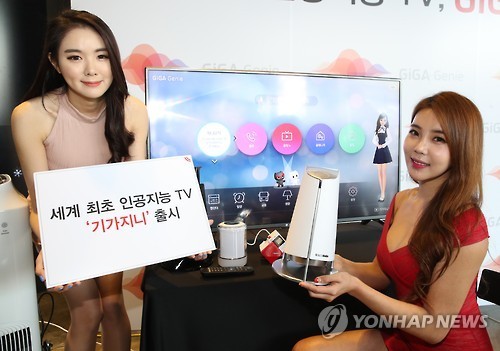South Korea's telecom giants are engaged in a war of nerves over the title of "world's first" concerning the artificial intelligence-based Internet TV service, which could hurt customers, industry watchers said Thursday.
The controversy revolves around KT Corp.'s TV set-top box with an AI system. The top Internet service provider requested the broadcast advertising watchdog Wednesday suspend deliberation of its planned TV commercial on the new device.
 |
Models pose during KT Corp.'s launch ceremony for a TV set-top box with artificial intelligence on Jan. 17, 2017. (Yonhap) |
The request came after controversy flared up over KT's online and offline ads on the device, which include the phrase "the world's first." In South Korea, companies should obtain a blessing from the watchdog before running TV ads.
In mid-January, KT unveiled the set-top box, dubbed "Giga Gini," which allows users to interact with the machine using natural conversation. Through the device, users can check e-mail, calendar appointments and news, listen to music and control other Internet-linked home appliances via TV.
Unlike other voice assistance services, the set-top box allows users to give commands through the TV screen.
Since the rollout, KT has launched an advertising blitz, claiming the device is the first of its kind in the world. However, the company soon faced criticism that the new AI set-top box is similar to existing devices in that it links Internet Protocol television with a voice assistant.
In 2015, Apple and Amazon unveiled IPTVs with their own voice assistant services. In the domestic market, South Korea's top mobile carrier SK Telecom Co. launched a home assistant service late last year. The service, called NUGU which means "who" in Korean, is an advanced voice recognition butler service that allows users to control home appliances and listen to music using voice commands.
"We see no problem in the fact that the AI-based set-top box is the first of its kind in the world, but we plan to supplement data in order not to leave room for controversy," a KT official said.
"However, we have yet to decide whether to omit 'the world's first'
from our advertising copy."
KT claimed it has installed its own voice assistant in a speaker-shaped set-top box for the first time in the world, and Giga Gini offers a far wider range of services than existing models.
It is not the first time for local telecom companies to engage in the "world's first" controversy.
In January 2015, SK Telecom ran a TV ad claiming it had succeeded in commercializing the so-called 3-band LTE-Advanced service for the first time in the world. KT filed a lawsuit against SK Telecom, arguing the ad was fake and exaggerated. The two firms resolved the issue via an out-of-court settlement.
The LTE-A service, four times faster than the Long Term Evolution service, is based on carrier aggregation technology, which bundles more than two frequency bands to increase bandwidth, and offers a download speed of up to 300 megabits per second, roughly four times faster than 75 Mbps on the existing LTE network.
SK Telecom was also involved in a similar controversy during last year's Mobile World Congress in late February. On the opening day of the fair, SK Telecom Co. demonstrated its 5G network technology with a transmission speed of 20.5 gigabits per second, claiming it was the world's first company to do so at a public place.
The speed of 20Gbps can be considered 270 times faster than the early stage of the long-term evolution network. It takes only around a second to download a full 2 gigabyte movie.
However, controversy erupted as Swedish telecom equipment developer Ericsson had earlier succeeded in transmitting data at a speed of more than 25 Gbps.
Industry watchers attribute the incessant "world's first" controversy to the breakneck competition among local telecom companies, which could eventually hurt customers.
"Exaggerated and fake advertisements could dupe consumers into picking the wrong products," said Yoon Moon-yong, an official at the Green Consumer Network in Korea. "The government should get tough on such ads and come up with measures to protect users." (Yonhap)




![[Herald Interview] 'Trump will use tariffs as first line of defense for American manufacturing'](http://res.heraldm.com/phpwas/restmb_idxmake.php?idx=644&simg=/content/image/2024/11/26/20241126050017_0.jpg)

![[Health and care] Getting cancer young: Why cancer isn’t just an older person’s battle](http://res.heraldm.com/phpwas/restmb_idxmake.php?idx=644&simg=/content/image/2024/11/26/20241126050043_0.jpg)

